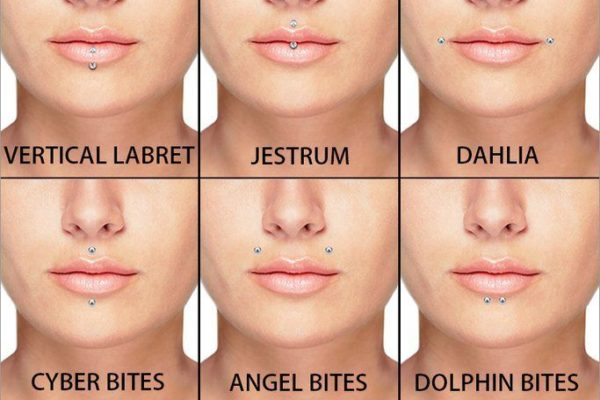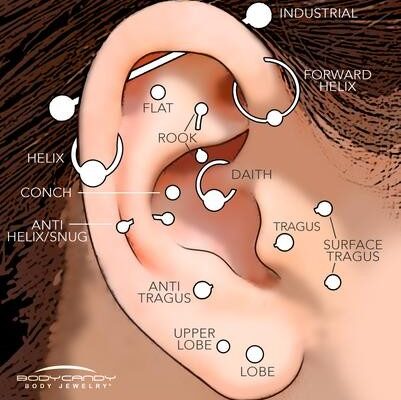Piercing Aftercare Advice
If your piercing is dressed, you may remove dressing after 2 hours as long as you are in a clean environment, however we recommend keeping it on overnight for the first night. It’s normal to find a small amount of dried blood when removing the dressing, particularly with navel piercings.
CARING FOR YOUR PIERCING
1) Wash your hands really well before you clean or touch your piercing for any reason. Try to avoid touching it at any time other than cleaning.
2) Make a saline solution:
Dissolve 1/8 teaspoon of salt into one cup (8 oz.) of warm boiled tap or bottled water. A stronger solution can irritate your piercing, so don’t put in too much salt!
Saline soak your piercing for for five minutes at least once per day. For some piercings it will be easier to use clean gauze, clean paper towels or clean cotton buds soaked in saline solution. Rinse with clean water after your salt soak to prevent salt crystals forming, which can cause irritation and slow the healing process.
3) It is normal for dried blood or serous fluid (yellow crust) to form around the edges of your piercing. DO NOT pick it away while it is dry. While showering or bathing, you may gently clean the jewellery and the piercing. Leave the soap on the piercing no more than thirty seconds. This is the best time to remove any crusty build up as it should soften. Removing it when dry could cause the wound to be re-opened. Dry your piercing gently with clean, disposable paper products. Cloths and towels could snag on jewellery, and they might have bacteria on them.
4) You do not have to rotate your jewellery through the piercing. This will irritate the area and increase the time it will take to heal.
5) It’s ok for your piercing to get wet, but avoid submerging in dirty water or unclean swimming pools.
6) DO NOT attempt to change your jewellery until the piercing is completely healed.
Different piercings have different healing times. Healing time can also be affected by your general health, medical conditions and whether or not you are a smoker. Here’s a very rough guide of what to expect, but this can vary wildly from person to person:
- Earlobe: 6 to 8 weeks
- Ear cartilage: 4 months to 1 year
- Eyebrow: 6 to 8 weeks
- Nostril: 4 to 6 months
- Septum: 6 to 8 months
- Tongue: 6 weeks
- Lip: 2 to 3 months
- Belly button: 4 months to 1 year
- Nipples: 12-16 weeks
You may also notice that your piercing goes through different phases, where it will appear to be healed but then flare up. This can be due to catching your piercing on a piece of clothing for example, or it could be if your body is run down.
7) Some piercings are prone to “irritation bumps”. This is usually due to trauma at the site and is common with piercings performed by a gun (one of the many reasons we only use needles). It can also be due to catching your piercing or sleeping on it. Nostril and outer ear, cartilage piercings are most prone to this. If you develop an irritation bump, even if your piercing has previously been healed, its a good idea to resume the same care activity as when your piercing was fresh. A saline soak or a little tea tree oil once every couple of days can help reduce irritation and swelling.
8) It is normal for piercings to be swollen for the first week or so after piercing. For this reason your piercer should perform the initial piercing with jewellery that is slightly longer than necessary. If you are finding that your piercing is inflamed and sore for longer, tea tree oil can often alleviate this discomfort.
FOR ORAL PIERCINGS
- Rinse your tongue or lip piercing after every meal or snack and before bed. Use an antibacterial, alcohol-free mouthwash.
- Do not kiss anyone while you heal. (Avoid contact with someone else’s saliva.)
- Do not share cups, plates, forks, knives, or spoons
- Eat small bites of soft food
- Avoid spicy, salty or acidic foods and drinks for a few days
- Avoid have hot drinks, like coffee, tea, or hot chocolate for a few days
- Be gentle. Talk and chew carefully, and try not to click your jewellery against your teeth.
- Check every once in a while to make sure your jewellery ball is still tightly screwed in place, to prevent swallowing or choking.
If you have any questions please message us on Facebook or if you are worried about your piercing contact a pharmacist or medical professional immediately.


